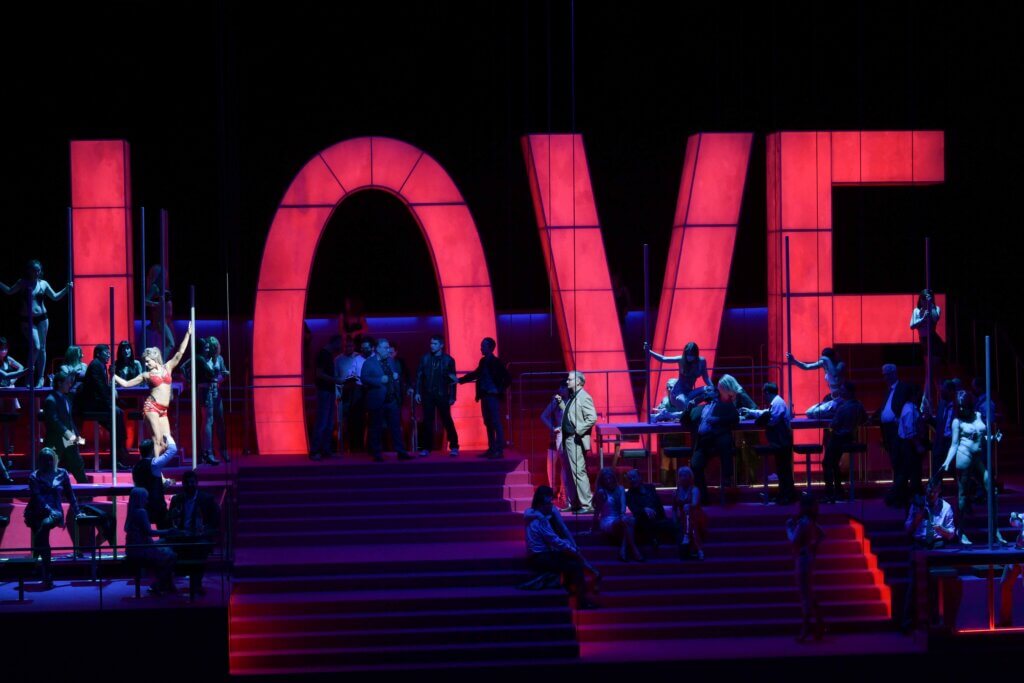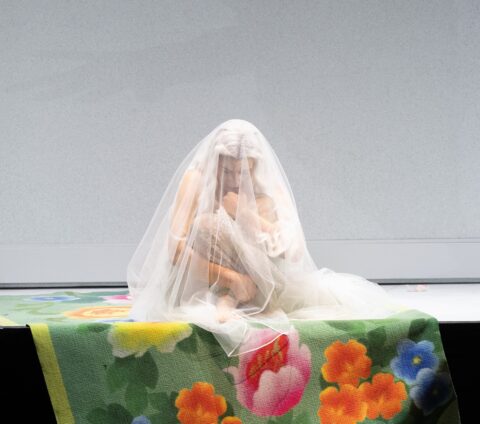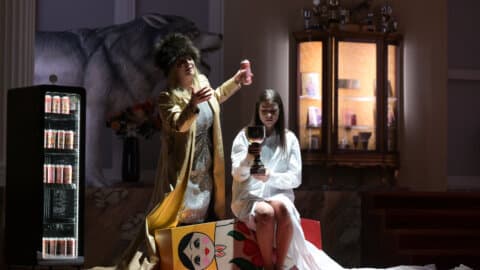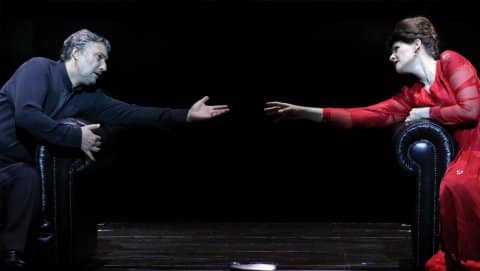MANON LESCAULT • OPER FRANKFURT
★★★★★★

Photo: Barbara Aumueller
MANON LESCAULT REVIEW: ASMIK GRIGORIAN BRINGS DOWN THE HOUSE IN FRANKFURT
LOVE is written there, so there’s no mistaking it. Each letter is almost 10 metres high and seems carved out of concrete. A six-star version of Puccini’s early tearjerker Manon Lescault is set to go, with star soprano Asmik Grigorian in the lead.
Together, the four letters fill the entire width of the stage, while also acting as support pillars for the highway bridge that runs up under the ceiling.
Of course, a minibus trundles onto the stage and drops off a group of passengers at the motorway restaurant where young student Renato des Grieux is about to meet young, beautiful Manon Lescault, with whom he falls in love instantly, irrevocably and fatally for both parties. It is Puccini, after all, who is at stake.
Manon Lescault is only Puccini’s third opera, but STOP IT, he could already compose.
Already here we meet Puccini’s special compositional technique, where the orchestra paints the clear melodic lines and the singers, so to speak, ‘sing right on top’, so you get this grand orchestration of clear melodic lines that just go straight to the heart.
The orchestra is big-playing with a beautifully rounded sound, under the direction of Frankfurt debutant Modestas Pitrenas.
Lithuanian soprano sensation Asmik Grigorian brings down the house in her first aria, and the few rubble left is cleared by fabulous Mexican-American tenor Joshua Guerrero with a rousing display of true tenor power, added to long black, slicked-back, Italiano hair.
The hall resounds with bravo shouts and applause, and we’ve only just begun.
With a show of stagecraft I’ve never seen before, the highway now lowers over the letters, while turning around on itself, transforming into a decadent nightclub brothel- with a gaudy interior that is immediately populated with dozens of seductively sexy, undressed women led by Manon Lescault. I’ve never heard the audience applaud a scene change before. But that’s where we are.
How the concrete letters simultaneously morphed into red neon, I didn’t understand at all.
Asmik Grigorian sings the rest of this act wearing only a glitter bikini, debunking for all time the myth that singing opera at the top level requires an overweight sound box.
Asmik sings so that tears are constantly pressing as she exposes her tortured soul – hourless in search of true love on one hand – and a free life of lust and luxury on the other. It has to go wrong, and it does.
Asmik Grigorian was the very reason I travelled to Frankfurt to attend the premiere of this 2nd comeback staging of the Puccini classic in Catalan Alex Ollé’s terrific staging, with wild stage design by his regular partner Alfons Flores.
A magnificent performance that has made headlines in the world’s opera media, and helped Frankfurt Opera to be voted Germany’s Opera House of the Year in 2021/2022. For the 4th time in a row and 27th time in total, someone told me in the intermission.
Without blinking, I can say that both Asmik Grigorian and the performance itself exceeded my towering expectations.
She sings with a rare vocal exuberance in the high parts, and with a timbre that associates with mahogany and maple syrup. Does that sound too strange? Check it out for yourself. Asmik sings Jenufa at the Staatsoper in Berlin in 2023 and there you (also) see me. Premiering April 20.+ 22.
The set continues to astound as, after intermission, it transforms into a sort of Guantanamo prison with incarcerated whores in cages, from which the now criminalized Manon (that’s a longer story) must be deported from Le Havre to America.
The story is a bit like La Traviata. It is perhaps not quite as tightly told as, say, La Bohême, which followed shortly after. But the opera was Puccini’s international breakthrough, and that’s understandable. The music is superb and sets the stage for world-class soloists to deliver the very best.
The opera’s finale is a graphic masterpiece with only the giant LOVE letters on stage in brilliant lighting, in which the two lovers perish in each other’s arms – while tears whip down the cheeks of the well-dressed Frankfurt repremiere audience, placing this Manon Lescault as one of the most beautiful and poignant opera performances I have attended.
There’s no way around six stars. The performance can be seen well into 2023 and cannot be recommended highly enough.

MY FRANKFURT QUICK TIPS
After theatre time, dine at the Fundus theatre restaurant on the corner of the theatre building itself.
The food is excellent, without being cusine or otherwise showy, but the atmosphere is lively and the service is on point. Creamy spinach soup with Riesling and rump steak with Rioja have never gone wrong, as far as I know.
It’s funny when some of the stars from the evening’s performance tumble in to applause and shouts of bravo.
Frankfurt is Germany’s 7th largest city with just 700,000 inhabitants. It is the home of the Euro and houses the European Central Bank as well as a number of other big business headquarters.
The city was so unfortunately bombed to pieces in 1944 but has risen as a German and international financial center with a Manhattan-like skyline along the River Main (a tributary of the Rhine) that is utterly un-European and beautiful in its own way.
The slightly unglamorous but also affluent middle-class modernity is reflected in large, exceedingly busy shopping centres, while a pretty, rebuilt area of old merchants’ houses in romantic half-timbering near the cathedral and town hall provides a welcome breathing space.
The large Christmas market in December is very similar to the one on Kgs. Nytorv in Copenhagen or Alexanderplatz in Berlin. I found a really good Frankfurter Stadtwurst and enjoyed it unreservedly before rushing inside to drink beer at the old brewery around the corner.
Frankfurt is a congenial acquaintance that I look forward to revisiting, preferably in slightly warmer months.
For example, when Barrie Kosky revives Handel’s Hercules in April/May 2023.




